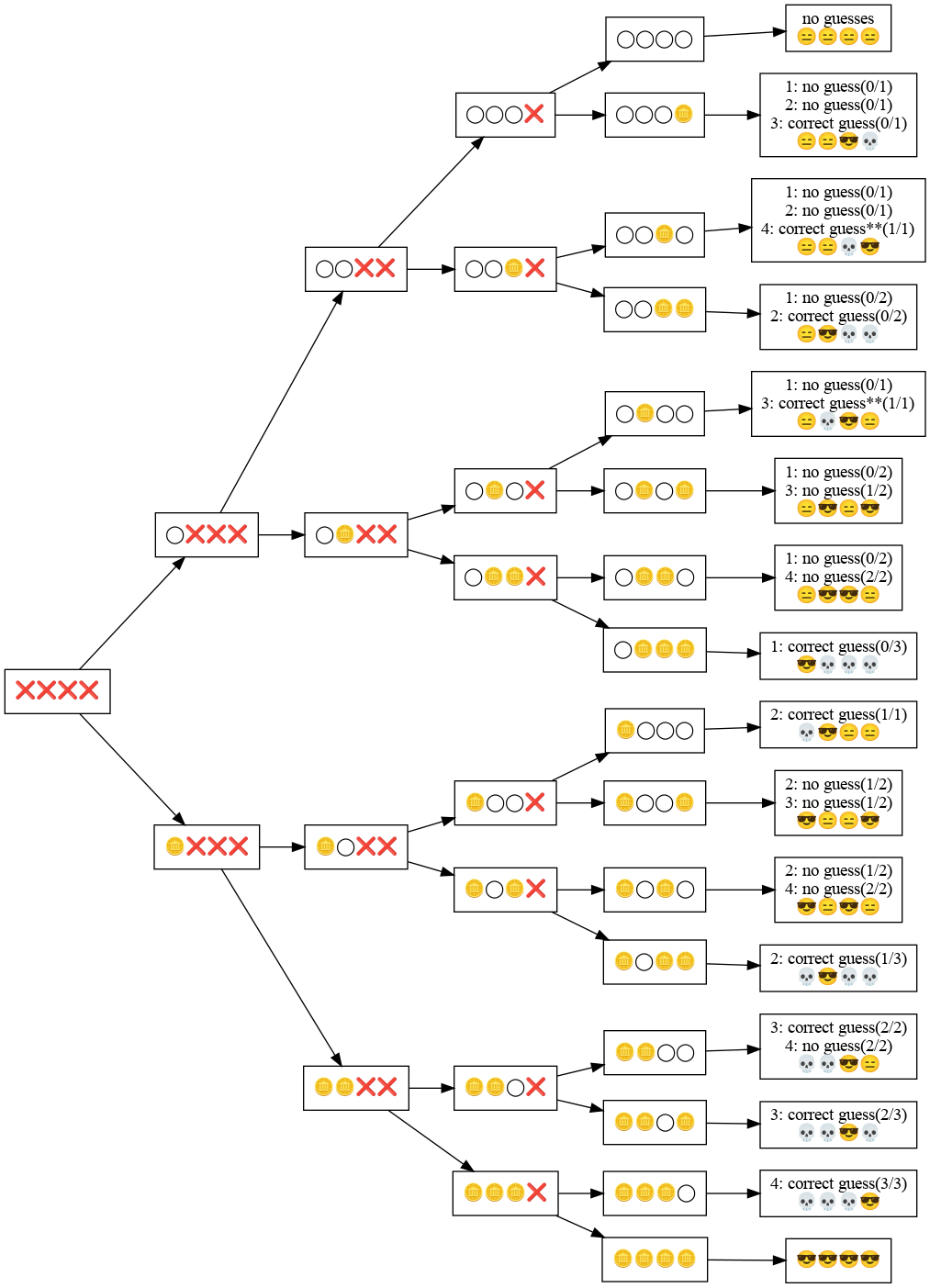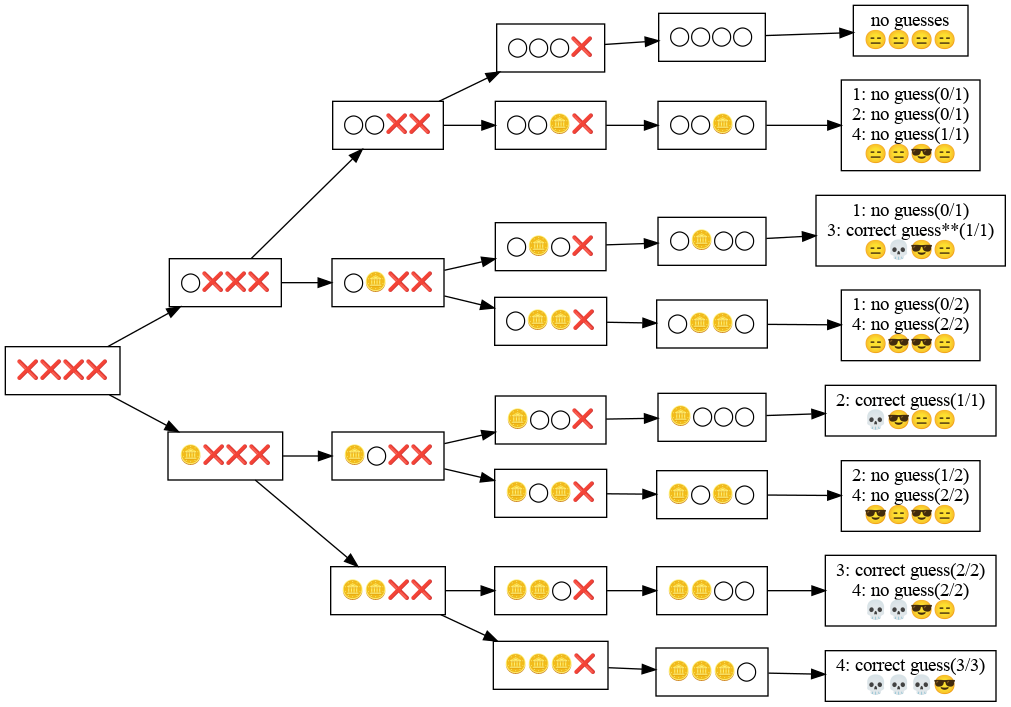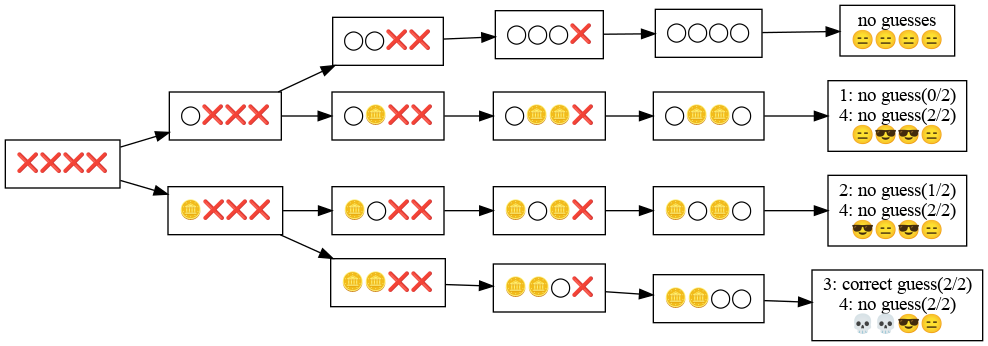There is at least one equilibrium where even with perfect knowledge of every other prisoner's strategy, no prisoner can improve their odds of survival or escape by changing strategies.
At one such equilibrium:
98 prisoners go free, 2 remain imprisoned, 0 die.
I will show how I get there by starting at a naive strategy for all prisoners, and then choosing one prisoner at a time to improve their outcome by changing strategies. (Or skip to the final timeline if you just want to see the strategies).
The first timeline
The prisoners first consider a narrow-minded induction strategy, reminiscent of the Unexpected Hanging Paradox.
Prisoner 1 sees and empty bowl, and would never put a coin in because prisoner 2 will know, guess correctly, and kill them. Thus, prisoner 1 can be ignored. Prisoner 2 can't put a coin in because prisoner 3 would see it, know that prisoner 1 didn't put it there, and so guess correctly and kill them...
By induction, prisoner N<100 sees an empty bowl, and would never put a coin in, because if they did then prisoner N+1 would know that prisoners [1, N-1] couldn't have put it there, guess N, and kill them.
Until the base case
Prisoner 100 sees an empty bowl, and would never put a coin in, because prisoner 99 would know that an empty bowl passed them, therefore prisoner 100 is the only one who could have put the coin in. Prisoner 99 would guess correctly and kill them.
In this timeline, no prisoners go free.
The second timeline
Prisoner 1 deduces that the above would happen. They prefer freedom to imprisonment, so they make a different choice.
Suppose prisoner 1 puts a coin in anyway. Prisoner 2 sees this and wonders if perhaps Prisoner 1 was not such a perfect logician, or she did not prefer life to death, or she had some doubts about prisoner 2's deductive prowess. Thinking his freedom assured, Prisoner 2 passes the bowl, planning to rat out Prisoner 1 and win his freedom.
Then,
Prisoner 3 receives the bowl. She does not know which of the two prisoners before her put a coin in. Since Prisoner 4 won't be able to deduce the answer either, prisoner 3 knows that she can safely put a coin in and go free. And so on until prisoner 100. Prisoner 100 knows that if he puts a coin in, then whomever did not put a coin in would see 99 coins. Wanting to avoid this, he does not put a coin in.
On to the guessing phase
Prisoner 2 sees 98 coins. He knows that if prisoner 100 had received a bowl with 98 coins, they would be obligated to pass. So he is about to make his guess but... he can't. He's not sure. Any of prisoners [3, 99] could have deduced that he would make that guess, and therefore passed, allowing prisoner 100 to put the coin in. Prisoner 100 cannot guess either. He remains in prison.
And so
All prisoners except 2 and 100 go free. Nobody dies.
...But wait!
The third timeline?
Prisoner 2 deduces the above timeline. Preferring freedom to imprisonment, he considers an alternative.
He puts a coin in. Or he imagines that he might do so. What if he did? Then, Prisoner 3 would see the same situation as he did in the second timeline. Since prisoner 3 also knows how that timeline ends up, they'd put a coin in to avoid imprisonment, and so on, until prisoner 99. Prisoner 99 knows that if she puts a coin in, then Prisoner 100 will see 99 coins and kill them all. So she passes. Prisoner 100 also passes for the same reason as timeline 2. Then prisoner 99 correctly names prisoners 1-98 as the coin-placers, kills everyone, and goes free.
When the dust settles
98 prisoners are dead, one goes free, and one remains imprisoned.
The fourth timeline
Prisoner 98 sees the impending calamity, and moves to prevent it.
He passes. Prisoner 99 sees the same situation as the second timeline, puts a coin in, and goes free.
The fifth timeline
With all prisoners aware of all of the above possibilities, random strategies begin to emerge.
The default strategy for all prisoners is to place a coin if there are at least two coins missing from the bowl, otherwise, choose randomly.
The last few prisoners get shafted by a couple extra restrictions.
Prisoner 98 must pass if there are no coins missing.
Prisoner 100 must pass if there is only one coin missing.
Using these strategies
All prisoners who place coins go free, because neither of the two who do not place coins can deduce who the other non-placer is.
The final timeline
Some prisoners can improve their odds.
Prisoners [1, 96]
Can put the coins in and be guaranteed freedom
Prisoner 97
Wants to always put a coin in, but if prisoners 99 and 100 know that she always puts a coin in, she'll die. So she sticks with the random strategy to be safe (they're "perfect logicians," so they would be able to predict her change of strategy if she were the sort of person to do that). So she chooses a random weight that assigns an arbitrarily low, but still non-zero, probability to passing.
Prisoner 98
does the opposite of whatever 97 did.
Prisoner 99
Wants to always put a coin in, but if whichever of 97 or 98 who didn't put a coin in before can be certain she did so, she will die. She plays random for the same reason that 97 did, and in the same way.
Prisoner 100
Does the opposite of whatever 99 did.
At this point, no prisoner can improve their outcome.





N=2and1putting a coin, what would2prefer?: (a) not put a coin, guess correctly, kill1and stay locked, or (b) put a coin, trigger "if there's no correct guess, all coin-givers will be freed" (since there have been no guessers), and go free. $\endgroup$